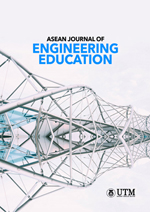Project-based Experiential Learning in Designing Truss Structure for First Year Chemical Engineering Students
DOI:
https://doi.org/10.11113/ajee2024.8n1.149Keywords:
Experiential learning, Truss design, statics, student-centered learning, project-based learningAbstract
The successful integration of a novel and dynamic project-based learning (PBL) methodology, grounded in experiential learning principles, within the pedagogy of the first-year Chemical Engineering program, yielded transformative outcomes in the teaching and learning of the Statics course. This endeavour involved a project-based experiential learning approach, wherein students actively engaged in the conceiving, designing, constructing, and testing a truss structure. This strategic shift from conventional teaching methods to a student-centred approach aimed to empower the learning experience. Facilitated by project-based experiential learning, students collaborated in groups to conceptualize, build, and evaluate the truss structure, fostering self-directed learning skills and enhancing 21st Century 4C skills. The project was designed based on constructivist learning theory, emphasizing experiential learning and scaffolded activities to support students in achieving the project's outcomes. Throughout the project journey, students consistently demonstrated proficiency in applying free-body diagram concepts, which aligns with the constructivist approach to learning. This evidence was documented in student-prepared vlogs, showcasing their ongoing application of theoretical knowledge to practical challenges. At the project's conclusion, a survey was conducted among 124 students in the first semester of the 2022/2023 academic year to assess project outcomes. The results indicated high levels of agreement among students, with 96% agreeing to collaboration elements, 90.4% to communication, 91.2% to critical thinking, and 90.4% to creativity. Moreover, 88.8% of students agreed that their knowledge in designing basic truss structures improved, 96.8% felt more confident in analysing truss structures, and 81.6% found creating montage videos beneficial. Through our innovative methodologies, we contribute to the advancement of engineering education and ensure that our students are prepared to face the challenges of the future with confidence and creativity.



















